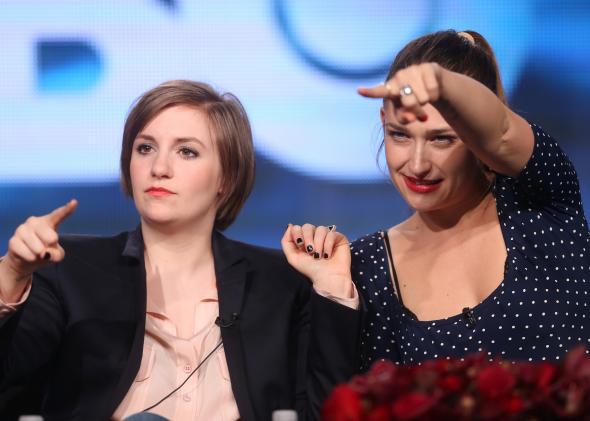On Thursday, Girls executive producers Lena Dunham, Judd Apatow, and Jenni Konner appeared at a panel at the Television Critics Association to talk about the upcoming third season of the HBO show. The first question from the critics came from The Wrap’s Tim Molloy, who asked:
I don’t get the purpose of all the nudity on the show. By you particularly. I feel like I’m walking into a trap where you say no one complains about the nudity on ‘Game of Thrones,’ but I get why they’re doing it. They’re doing it to be salacious. To titillate people. And your character is often naked at random times for no reason.
Dunham responded: “Yeah. It’s because it’s a realistic expression of what it’s like to be alive, I think, and I totally get it. If you are not into me, that’s your problem.” Apatow had a question of his own for Molloy: “Do you have a girlfriend?” Apatow asked. “Does she like you?” Later, Apatow and Molloy spoke privately about the tenor of his question. “It is very offensive,” Apatow said. “It’s sexist and offensive, it’s misogynistic.” Molloy disagreed. “Everyone I know has wondered the same thing,” he told Apatow. “I don’t understand as a writer, what the reason for it is. I’m not against it.” Later, on Apatow’s advice, Molloy checked with his girlfriend; for the record, “She’s cool with what I asked.”
Except that Molloy didn’t exactly “ask” anything. His question was not a question; it was a rambling statement of his own inability to understand how Dunham uses nudity in the show, followed by a statement that the choice is “random” and there is “no reason” to justify it. The only legitimate reason for nudity that he purports to understand is its use for titillation purposes. That statement may not reveal Molloy to be an outright misogynist, but given the intensive and wide-ranging critical discussion of the use of nudity in Girls over the past few years, it does reveal him to be willfully naïve to Dunham’s work and its larger context.
Asking why Dunham regularly appears naked in the show was a legitimate question—in 2012. Dunham’s many answers on the topic—that pantlessness is inherently comedic, that showing average-sized women’s bodies in the media is so rare that it constitutes a radical act, and that the outsized attention and criticism she’s received for it wouldn’t be placed on a naked actress with “tiny thighs”—have demonstrated that there are copious and pointed reasons justifying the choice. For Molloy to approach the question from a place of total obliviousness to that discussion makes his statement not only lazy and dated, but ignorant.
When faced with charges of offensiveness, Molloy transcribed the entirety of his exchange in an attempt to prove that there was nothing sexist in the letter of his (not a) question. But the ickiness of his statement lies in not what he said, but in the vast, unstated context of the show that he fails to understand, with no indication that he’s ever even tried. It’s a mind-numbingly obvious place to begin a discussion of a show that’s now in its third season, and everyone except for Molloy who pays attention to Girls has advanced beyond that point. They’ve already cycled through all the fascination and the backlash and the measured justification; Molloy’s question effectively reboots the discussion to a place where Dunham is again prompted to rationalize her body for critics who can only comprehend the more traditionally sexualized bodies on full display in a show like Game of Thrones. My colleague David Haglund put it this way: “To him, ‘by you particularly’ means ‘you, in particular, are naked with a frequency that I don’t understand.’ But it sounds like ‘I especially don’t get why you are naked; the nudity of the other [read, possibly: more conventionally attractive] actresses I get.’ ”
Of course, it’s not particularly noteworthy for a critic to ask a stale and naïve question at a press conference. And the simple charge of “misogyny” from Apatow doesn’t feel quite right. What makes Molloy’s question so grating is that it operates through the soft, ambiguous sexism that marks modern discussions of women in the media, not in an old-school display of blatant misogyny that everyone now immediately recognizes as unacceptable. Lena Dunham isn’t just working against a media landscape that devalues and objectifies women; she must also contend with critics who are so casually unaware of that landscape that they just can’t “get” her work, so they throw up their hands and call it “random.”
